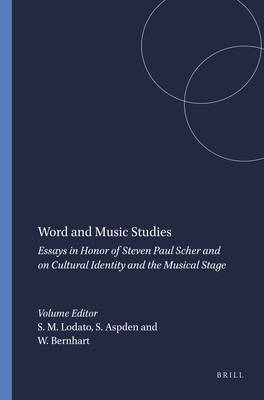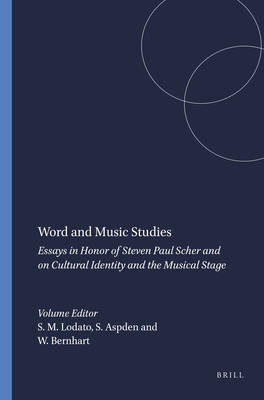
- Afhalen na 1 uur in een winkel met voorraad
- Gratis thuislevering in België vanaf € 30
- Ruim aanbod met 7 miljoen producten
- Afhalen na 1 uur in een winkel met voorraad
- Gratis thuislevering in België vanaf € 30
- Ruim aanbod met 7 miljoen producten
Zoeken
Word and Music Studies
Essays in Honor of Steven Paul Scher and on Cultural Identity and the Musical Stage
€ 195,45
+ 390 punten
Omschrijving
The eighteen interdisciplinary essays in this volume were presented in 2001 in Sydney, Australia, at the Third International Conference on Word and Music Studies, which was sponsored by The International Association for Word and Music Studies (WMA). The conference celebrated the sixty-fifth birthday of Steven Paul Scher, arguably the central figure in word and music studies during the last thirty-five years. The first section of this volume comprises ten articles that discuss, or are methodologically based upon, Scher's many analyses of and critical commentaries on the field, particularly on interrelationships between words and music. The authors cover such topics as semiotics, intermediality, hermeneutics, the de-essentialization of the arts, and the works of a wide range of literary figures and composers that include Baudelaire, Mallarmé, Proust, T. S. Eliot, Goethe, Hölderlin, Mann, Britten, Schubert, Schumann, and Wagner. The second section consists of a second set of papers presented at the conference that are devoted to a different area of word and music studies: cultural identity and the musical stage. Eight scholars investigate - and often problematize - widespread assumptions regarding 'national' and 'cultural' music, language, plots, and production values in musical stage works. Topics include the National Socialists' construction of German national identity; reception-based examinations of cultural identity and various "national" opera styles; and the means by which composers, librettists, and lyricists have attempted to establish national or cultural identity through their stage works.
Specificaties
Betrokkenen
- Uitgeverij:
Inhoud
- Aantal bladzijden:
- 324
- Taal:
- Engels
- Reeks:
- Reeksnummer:
- nr. 4
Eigenschappen
- Productcode (EAN):
- 9789042010031
- Verschijningsdatum:
- 1/01/2002
- Uitvoering:
- Hardcover
- Formaat:
- Genaaid
- Afmetingen:
- 155 mm x 230 mm
- Gewicht:
- 716 g

Alleen bij Standaard Boekhandel
+ 390 punten op je klantenkaart van Standaard Boekhandel
Beoordelingen
We publiceren alleen reviews die voldoen aan de voorwaarden voor reviews. Bekijk onze voorwaarden voor reviews.







